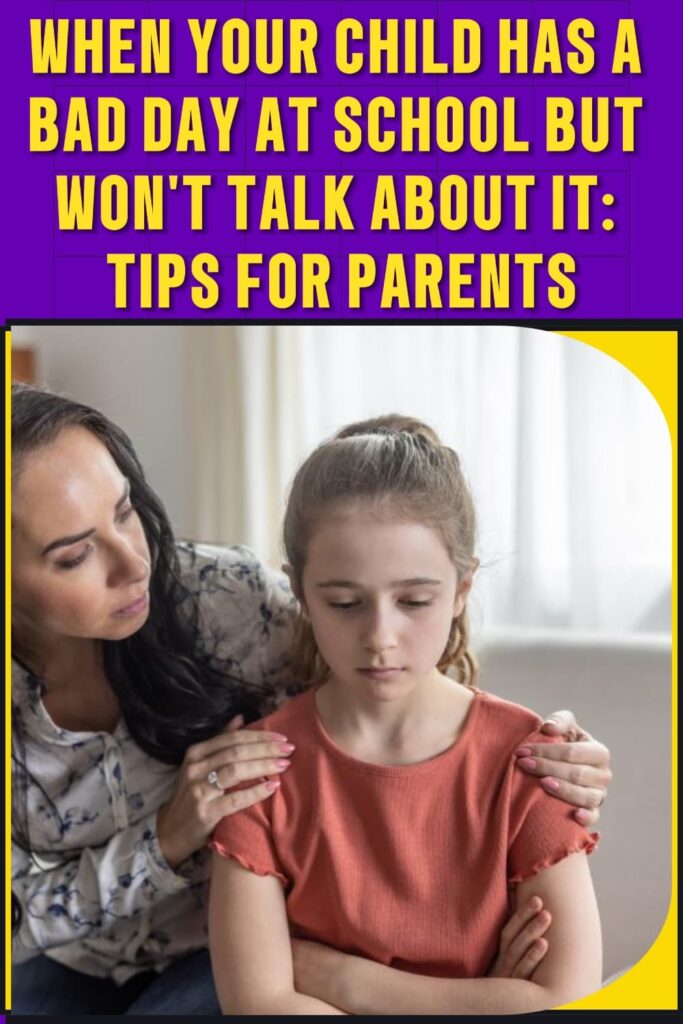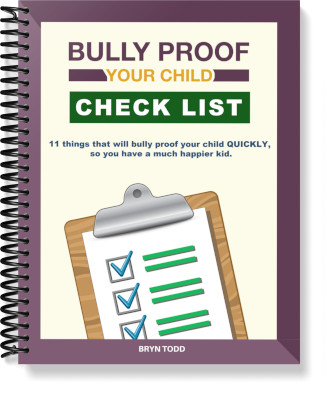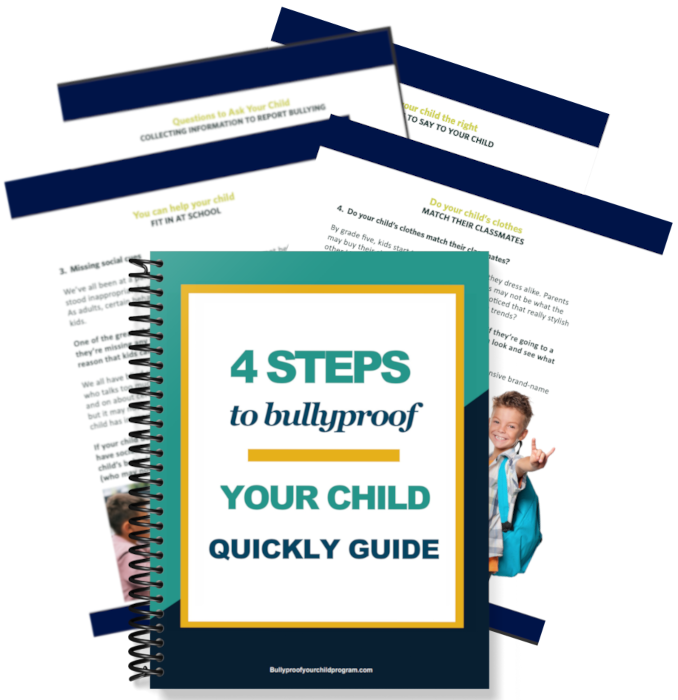
When your child has a bad day at school and won’t talk about it you may be wondering what is going on in their world. As a parent, it’s tough when you sense something’s off with your child after a day at school. They come home, maybe quieter than usual or not as interested in their favorite activities.
It’s these subtle changes that can signal they’re facing something hard, something they might not know how to express.
In this blog post, we’ll explore how to read these signs and provide the support your child needs. From understanding their silence to recognizing when to seek professional help, we’ll guide you through ways to approach these delicate situations.
It’s all about being there for them, in the way they need you the most.
Recognizing Signs of a Bad Day
When your child has a tough day at school, they might not always say it, but you’ll see it. You might notice subtle changes. They could be quieter at dinner, or maybe they’re not laughing at the TV show they usually love.
These small shifts can be telltale signs they’re struggling with something. Remember, you’re there for them.
Here are some signs you can look out for that may indicate that your child is struggling:
Change in Behavior
Sometimes you just know something’s off. Maybe your usually chatty kid is now silent, or your calm little one seems on edge. These can be bothering. They’re like silent signals, telling you your child might be struggling.
Look out for these signs:
- They don’t want to do things they usually love.
- They’re staying away from friends or not wanting to go out.
- They’re sticking close to you more than usual.
- They’re having trouble with sleeping or don’t feel like eating.
Physical Symptoms
Struggling with stress or worry doesn’t just stay in your child’s mind – sometimes, you can see it in their little body too. It’s heartbreaking to see, but being aware of these physical signs is crucial.
They might not always tell you what’s wrong, but their body sometimes gives small hints. Watch for these signs:
1. Headaches: If your child often complains of headaches, it might be more than just physical. It could be the weight of worry pressing down on them.
2. Stomachaches: Those tummy troubles could be knots of anxiety or stress, not just something they ate.
3. Nausea: Feeling queasy can be a sign they’re feeling really nervous or anxious about something.
4. Fatigue: If they’re more tired than usual, it might be the emotional exhaustion from stress.
5. Rapid heartbeat: A racing heart can be a sign of anxiety, like a little drum beating fast with worry.
When you see these signs, gently open a conversation. Ask them how they’re feeling and what’s on their mind.
Sometimes, just knowing you’re there to listen can ease their burden. And remember, it’s always wise to consult a healthcare professional to ensure there’s nothing more serious at play.
By being attentive to these subtle signs, you become their ally in navigating the choppy waters of school life and emotions. Your understanding and support are important in helping them not just to cope, but to thrive.
Understanding Your Child’s Silence
If you can feel something’s not right, but they don’t utter a word about their day, it’s natural to feel a mix of worry and frustration.

Remember, your child’s silence doesn’t mean they don’t want to share; sometimes, they just don’t know how to start or they need a bit of time to understand their own feelings.
Here’s how you can be there for them, even in their silence:
Respecting Their Space
It’s so important to remember that sometimes kids need their own space. They might be trying to figure things out in their own way, or maybe they just don’t have the words yet.
As a parent, this can be tough. You might feel helpless or anxious, wanting to fix everything but not knowing how. Pushing them to talk can sometimes add to their stress, making them feel pressured.
The best thing you can do? Just be there for them. Let them know, gently, that you’re ready to listen whenever they’re ready to talk.
Say something like, “I’m here for you, no matter what, whenever you’re ready to share.” This way, they know they can come to you when they’re ready, without feeling any pressure.
And while you wait for them to open up, just be their quiet strength. Be the calm in their storm. Your understanding and patience, that’s your way of showing love and support, even when the words aren’t coming.
This approach can really make a world of difference for your child.
The Role of Patience
Patience here is your best ally. It’s not easy, I know, to wait when all you want to do is fix everything. But trust me, giving them time is the best gift you can offer.
They need a moment, maybe more, to sort through this tangle of feelings. Pushing them before they’re ready might just push them away.
So, what can you do? Just be there. Make your home a safe harbor, a place where they know they’ll always be heard and never judged.
Show them, with your calm presence, that it’s alright to take their time. When they’re ready to let you in, they’ll know you’re there, waiting with open arms and an open heart.
Every kid is different, and there’s no magic formula to get them talking. But your patience, your understanding, and your unconditional love? That’s the secret recipe for helping them find their way back to you, in their own time, in their own way. Just hang in there. You’re doing great.
Effective Communication Strategies
Dealing with your child’s silent struggle after a bad day at school can leave you feeling helpless. But remember, there are gentle ways you can nudge them to open up. It’s all about how you communicate.
Here are some effective communication strategies that you can use to encourage your child to open up and share their thoughts and feelings with you:
Non-Verbal Communication
When your child struggles to find the words after a hard day, remember, your silent language of love speaks volumes.
Here’s how you can use non-verbal cues to bridge the gap:
1. Physical touch: Sometimes, all the words in the world can’t match the comfort of a warm, reassuring hug. When your child seems lost or down, open your arms. It’s your way of saying, “I’m here, you’re safe.”

2. Eye contact: When they do talk, look into their eyes with all the love and attention you can muster. It’s like telling them without words, “I see you, I hear you, you matter.”
3. Facial expressions: A soft smile, a gentle nod, or a look of concern can show your child that their feelings are important to you. It’s like a silent conversation where you’re saying, “I understand, and it’s okay.”
Asking Open-Ended Questions
Every time you try to understand how your child’s day went, especially on those days when they seem weighed down, asking open-ended questions can open doors to their inner world.
Here’s how you can gently nudge the conversation:
1. “Tell me about your day, sweetheart.” This simple question invites them to unfold their day in front of you, sharing the ups and downs in their own words.
2. “What was the best part of today for you?” This nudges them to sift through their day and find a sparkle, something that made them smile or feel proud.
3. “Was there anything that felt tough today?” This question shows that you’re ready to listen to their struggles, offering a safe space for them to share their challenges.
Your approach here isn’t just about getting answers. It’s about creating a space where they feel heard and understood, where they know that whatever they say, you’re there to listen and support, without judgment or hurry.
It’s in these moments, these everyday conversations, that you’re building a bridge of trust and comfort, showing them that no matter what the day brings, they can always share it with you.
Providing Emotional Support
It’s like a silent signal for you to step in with all the heart and warmth you’ve got, when your child comes home with that quiet storm brewing inside them, after a tough day at school.
Providing emotional support isn’t always about finding the right words; sometimes, it’s about being there and being present.
Here’s how you can wrap them in your support:
Affirmations and Reassurances
Sometimes all they need is to hear your unwavering support. Tell them, in your own heartfelt words, how much they mean to you. Let them feel the depth of your love and the strength of your commitment to always be there for them.
You can offer affirmations and reassurances, such as:
1) “I’m here for you.”
2) “I love you.”
3) “I’m proud of you.”
4) “You’re doing your best, and that’s all that matters.”
This reassurance, simple yet profound, can be the anchor they need in turbulent times.
Creating a Safe Space
Having a safe space is like giving them a warm, secure cocoon. This safe haven can be as simple as a snug corner in their room filled with their favorite things, a place where the world’s noise dims and they can breathe.

It’s also about crafting a mental sanctuary, a special bond between you two, where they know their thoughts and feelings are always met with love, understanding, and a listening ear. This is where they can unburden their heart, knowing they’re embraced and accepted, always.
Some ways to create a safe space include:
- Listening without judgment
- Being patient and understanding
- Offering comfort and hugs
- Encouraging them to express their feelings
- Keeping conversations confidential
By carving out a safe space for your child, you’re sending a powerful message: “I’m here, always, whenever you need me.”
This sanctuary, be it a quiet corner in their room or simply your presence, tells them they have a place to turn to, a place where worries are understood and fears are gently eased.
It’s more than physical comfort; it’s the emotional reassurance that in their toughest moments, they’re never alone – you’re with them, every step of the way.
Is Your Child Being Bullied at School?
When your child comes home from school, their silence speaking louder than words, your heart might sink with worry. Could they be facing a bully?
The thought alone can stir a storm of concern and protectiveness within you. Children often hide their bullying struggles, burdened by embarrassment or fear.
As a parent, understanding the subtle signs of bullying is crucial. It’s about being their silent guardian, ready to step in, to shield them, and to stop the hurt they might be too scared to voice.
Your vigilance and your gentle approach can make all the difference, turning a time of silent struggle into a moment of shared strength and healing.
Sometimes Kids Don’t Tell Parents When They Are Being Bullied
When it comes to children facing bullying, one of the heart-wrenching realities is that they might be hesitant to share their experiences.
The fear of speaking up often stems from a complex mix of emotions. They may worry about being perceived as weak or vulnerable.
In their minds, admitting they’re being bullied might seem like exposing a flaw, something they think might disappoint you or make them appear less in your eyes.
As a parent, it’s crucial to understand this internal conflict. Your child’s reluctance to share isn’t a sign of mistrust towards you, but rather a manifestation of their fear and uncertainty.
Some signs that your child may be being bullied include:
- Unexplained injuries or bruises: When they come home with scrapes or marks they can’t or won’t explain, it’s a warning bell that something may be happening to them.
- Loss of appetite or trouble sleeping: Changes in basic habits like eating and sleeping can be telltale signs of stress or anxiety caused by bullying.
- Avoiding certain places or activities: If they suddenly don’t want to go to places they used to love, it might mean they’re trying to avoid a bully.
- Suddenly doing poorly in school: A drop in grades or a lack of interest in schoolwork can be a reaction to the emotional toll bullying takes.
- Withdrawing from friends and family: If they start to pull away from the people they love, it can be a sign they’re struggling internally with their experiences.
Recognizing changes in your child’s behavior is a crucial moment for any parent. Gently let them know, “I’m here for you, and we can talk about anything that’s bothering you.” This reassurance is crucial for making them feel supported and understood.
If you suspect bullying, immediate action is necessary. Speak with their teacher or school principal to discuss your concerns and determine the best course of action. Additionally, seeking external support like counseling might be beneficial for your child’s emotional well-being.
Understanding that bullying is a serious issue is essential. It can significantly impact your child’s mental health and sense of safety. By being alert to the signs and intervening effectively, you can help ensure your child feels secure and valued at school.
When to Seek Professional Help
Noticing your child continually struggling, more than just the usual bad day, can weigh heavily on your heart. It’s times like these when seeking professional help might be the best step forward.

Keep an eye out for these signs:
Identifying Persistent Issues
- Regular outbursts or tantrums leave you feeling helpless and them feeling out of control.
- Noticeable changes in their sleeping or eating habits that don’t seem to get better.
- A growing distance between them and their friends or family, as if they’re pulling away into a world of their own.
- Constant worry or anxiety seems to cast a shadow over their everyday joys.
- Any aggression, whether it’s directed at others, animals, or even themselves, signals a deeper turmoil.
- If they express thoughts of harming themselves or talk about suicide, it’s a glaring red flag.
When these signs become regular visitors in your child’s life, it might be time to consider reaching out to a mental health professional.
Seeing your child caught in a cycle of distress is heart-wrenching. You want to do everything in your power to help them find their smile again, to see them light up with the joy that seems so distant now.
Remember, seeking help is a courageous step. It’s not about admitting defeat; it’s about arming yourself and your child with the tools to overcome these challenges.
A therapist or counselor can offer new perspectives and strategies that might not be visible from where you stand.
It’s okay to feel hesitant or worried about this step. But know this: by choosing to seek help, you’re planting seeds of change and healing.
You’re starting on a journey that can lead to a brighter, healthier future for your child. This isn’t just about facing the present struggles but nurturing their long-term well-being and happiness.
Finding the Right Help
If it feels like your child is carrying a weight too heavy for their young shoulders, finding the right professional help can be a beacon of hope. It’s about choosing someone who can gently guide them back to a place of balance and strength.
Consider these options, each a potential ally in your child’s journey to wellness:
- School counselor: Often the first line of support, your child’s school counselor can be a familiar face in a known environment, offering guidance and resources.
- Pediatrician: Don’t underestimate the role of your child’s doctor. They can assess not just physical but mental health too and can point you toward the right mental health professionals.
- Therapist or psychologist: A licensed therapist can become a trusted figure in your child’s life. They offer a safe space for your child to explore their feelings and learn coping strategies.
- Psychiatrist: If there’s a need for medication, a psychiatrist can carefully manage this aspect, ensuring your child’s mental health is treated holistically.
Remember, reaching out for help is a sign of strength, not weakness. It’s an act of love and commitment to your child’s well-being. With the right support, you’re not just helping your child face their current challenges.
You’re equipping them with tools that will serve them throughout life, helping them grow into resilient, confident individuals.




